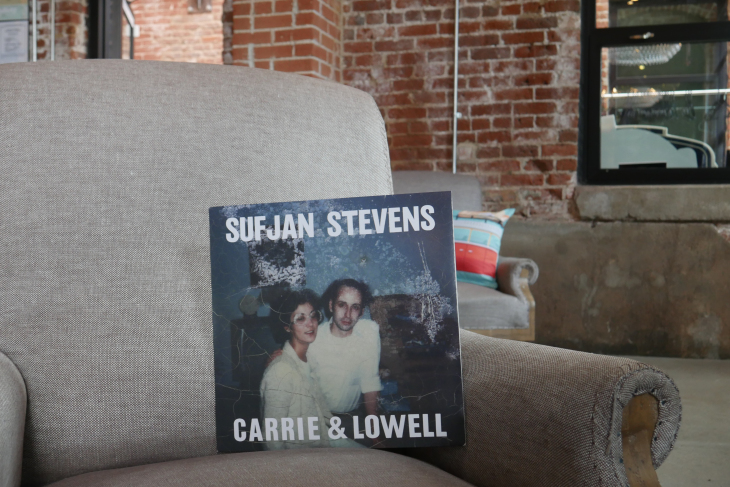Carrie and Lowell by Sufjan Stevens
February 20, 2019
There’s something inside of Sufjan Stevens, who is widely known as the stereotypical eclectic artist, that drives him to create the most beautiful scenes with his music.
He never limits himself to just one genre, typically dabbling in baroque indie folk and engaging with electronic pop and avant-garde stylings. To him, the only thing that limits music is the human mind. Notable for his live performances, he is often outfitted in elaborate costumes, including wings and huge hats.
Most notable to mention is his 50 States project, where he intended to write an album for each state. His second album of the project, Illinois, was the last, with him stating it was only a promotional stunt. It worked, fortunately, garnering him a larger audience and Album of the Year at the PLUG Independent Music Awards.
Asthmatic Kitty, the record label all of Stevens’ work has been put out on, was co-founded by Stevens and Lowell Barnes, one half of the namesake of this album’s title. His latest album, Planetarium, made in association with other artists, was put out by 4AD.
This beautifully haunting album represents a different kind of love. On Carrie & Lowell, he references events in his childhood that relate to his mother, who had died two years before the recording of this album. The recording took place in New York and a plethora of other places, in usual style, including Portland, Oregon and Eau Claire, Wisconsin.
The material on the album is raw and emotional, and doesn’t delight in a conventional sense. Carrie & Lowell is a very special album for Stevens and for his community of followers, earning the highest critical reception of his latest albums. None of the reviews are lower than an eight out of ten, with Pitchfork giving it 9.3 out of ten and Rolling Stone giving it four out of five stars.The album also charted better than any of his other albums, rising to number ten on the Billboard Hot 200, and charting only slightly higher in Britain and the Netherlands.
The songs themselves come together very well on the album. “Fourth of July” breaks the album up in the middle and is a haunting reminder of the subject matter, with Stevens singing about viewing the body of his mother and the flashbacks to memories of his family vacationing in Oregon in the summer. The album begins with “Death with Dignity,” a solid introduction to the instrumental style, and Stevens’ own struggle. He sings, “I don’t know where to begin” referencing him figuring out how to not only structure the album, but also how to deal with his loss. He sings about the process of mourning, and the ghost his mom has become to him.
I have always had a fascination with “Should Have Known Better,” the second song, and listening to it again I hear all the nuances of grieving he brings up in this song. In the first song he tells his mother he forgives her, and here he goes on to explain what he is forgiving “When I was three, maybe four, you left us at that video store” speaking about how his mother had abandoned him at a young age. Here he also brings up the “black shroud” that covers up his emotions, and how this experience is forcing him to pull back the veil.
The album was produced by a musical friend of his, Thomas Bartlett, who had recently lost a brother to cancer. His unique viewpoint and relationship with Stevens allowed him to really involve himself with the production, and “took all of these sketches and made sense out of it” in Stevens’ words, regarding working with Doveman, as Bartlett is called.
Another song I had previously been invested in is “Drawn to the Blood,” a very simple piece that talks about the “why” of grieving. The grief he feels pushes him towards the religious side of his music, and bears the raw emotion he felt.
The namesake of the album, “Carrie & Lowell” is a dedicated song to the people the album is about. “John My Beloved” is a difficult song to break down. I see it as the falling action, as Stevens beautifully alludes the relationship between his mother and Lowell, his stepfather, to his own, and how he wishes to be mourned.
The album leaves us with “Blue Bucket of Gold,” a resolution to the search he went through in the process of making this record. The ticking behind the faded piano adds a ghostly element that leaves the listener just as lost has he was at the beginning of his journey. The resolution is a false one, with no condolence, only more feelings of uncertainty and loneliness.
“I was recording songs as a means of grieving, making sense of it. But the writing and recording wasn’t the salve I expected. I fell deeper and deeper into doubt and misery. It was a year of real darkness. In the past my work had a real reciprocity of resources—I would put something in and get something from it. But not this time.” – Sufjan Stevens on his album, Carrie & Lowell.
This review was originally published on NewVinylMonday.com

